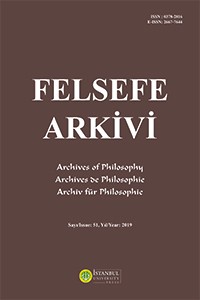Research Article
Year 2019,
Issue: 51, 153 - 160, 31.12.2019
Abstract
Logical pluralism is the theory that there is more than one right logic. Logical instrumentalism is the view that a logic is a correct logic if it can be used to fruitfully pursue some deductive inquiry. Logical instrumentalism is a version of logical pluralism, since more than one logic can be used fruitfully. In this paper, I will show that a logical instrumentalist must accept linear logic as a correct logic, since linear logic is useful for studying natural language syntax. I further show that this means that the logical instrumentalist must accept a wide range of connectives, in particular concatenation. I end by explaining why this is a feature rather than a bug.
References
- Allo, Patrick. 2013. “Noisy Vs. Merely Equivocal Logics.” In Paraconsistency: Logic and Applications, edited by Francesco Berto, Edwin Mares, Koji Tanaka, and Francesco Paoli, 57–79. Springer.
- Barker, Chris, and Chung-Chieh Shan. 2014. Continuations and Natural Language. Oxford University Press.
- Caret, Colin. 2017. “The Collapse of Logical Pluralism has been Greatly Exaggerated.” Erkenntnis 82 (4): 739-760.
- Carnap, Rudolph. 1937. The Logical Syntax of Language. New York: Harcourt, Brace; Company.
- ———. 1950. “Empiricism, Semantics and Ontology.” Revue Internationale de Philosophie 4. Eklund, Matti. 2012. “The Multitude View on Logic.” In New Waves in Philosophical Logic, edited by Greg Restall and Gillian Kay Russell. Palgrave Macmillan.
- Franks, Curtis. 2015. “Logical Nihilism.” In Logic Without Borders: Essays on Set Theory, Model Theory, Philosophical Logic and Philosophy of Mathematics, edited by Andrés Villaveces, Roman Kossak, Juha Kontinen, and Hirvonen, 147–66.
- De Gruyter. Haack, Susan. 1978. Philosophy of Logic. Cambridge: Cambridge University Press.
- Kouri Kissel, Teresa. 2018. “Logical Pluralism from a Pragmatic Perspective.” Australasian Journal of Philosophy 96 (3): 578–91.
- Moortgat, Michael. 1996. “Multimodal linguistic inference” 5 (3/4): 349–85.
- ———. 2009a. “Symmetric categorial grammar.” Journal of Philosophical Logic 38 (6): 681–710. https://doi. org/10.1007/s10992-009-9118-6.
- ———. 2013. “Typelogical Grammar.” Stanford Encyclopedia of Philosophy. https://plato.stanford.edu/ archives/win2016/entries/principle-beneficence/.
- ———. 2014. “On combining grammar logics,” no. September.
- ———. 2009b. “Symmetric Categorial Grammar.” Journal of Philosophical Logic 38 (6): 681–710. https:// doi.org/10.1007/s10992-009-9118-6.
- Pollard, Carl. 2013. “Agnostic Hyperintensional Semantics” 192 (March).
- Priest, Graham. 1987. Doubt Truth to be a Liar. New York: Oxford University Press.
- Roberts, Craige. 2012. “Information Structure in Discourse: Towards an Integrated Formal Theory of Pragmatics.” Semantics and Pragmatics 5 (6): 1–69. https://doi.org/10.3765/sp.5.6.
- Russell, Gillian. 2018. “Logical Nihilism: Could There Be No Logic?” Philosophical Issues 28 (1): 308–24. https://doi.org/10.1111/phis.12127.
- Shapiro, Stewart. 2014. Varieties of Logic. OUP. Varzi, Achille. 2002. “On Logical Relativity.” Noûs 36 (s1): 197–219.
Year 2019,
Issue: 51, 153 - 160, 31.12.2019
Abstract
References
- Allo, Patrick. 2013. “Noisy Vs. Merely Equivocal Logics.” In Paraconsistency: Logic and Applications, edited by Francesco Berto, Edwin Mares, Koji Tanaka, and Francesco Paoli, 57–79. Springer.
- Barker, Chris, and Chung-Chieh Shan. 2014. Continuations and Natural Language. Oxford University Press.
- Caret, Colin. 2017. “The Collapse of Logical Pluralism has been Greatly Exaggerated.” Erkenntnis 82 (4): 739-760.
- Carnap, Rudolph. 1937. The Logical Syntax of Language. New York: Harcourt, Brace; Company.
- ———. 1950. “Empiricism, Semantics and Ontology.” Revue Internationale de Philosophie 4. Eklund, Matti. 2012. “The Multitude View on Logic.” In New Waves in Philosophical Logic, edited by Greg Restall and Gillian Kay Russell. Palgrave Macmillan.
- Franks, Curtis. 2015. “Logical Nihilism.” In Logic Without Borders: Essays on Set Theory, Model Theory, Philosophical Logic and Philosophy of Mathematics, edited by Andrés Villaveces, Roman Kossak, Juha Kontinen, and Hirvonen, 147–66.
- De Gruyter. Haack, Susan. 1978. Philosophy of Logic. Cambridge: Cambridge University Press.
- Kouri Kissel, Teresa. 2018. “Logical Pluralism from a Pragmatic Perspective.” Australasian Journal of Philosophy 96 (3): 578–91.
- Moortgat, Michael. 1996. “Multimodal linguistic inference” 5 (3/4): 349–85.
- ———. 2009a. “Symmetric categorial grammar.” Journal of Philosophical Logic 38 (6): 681–710. https://doi. org/10.1007/s10992-009-9118-6.
- ———. 2013. “Typelogical Grammar.” Stanford Encyclopedia of Philosophy. https://plato.stanford.edu/ archives/win2016/entries/principle-beneficence/.
- ———. 2014. “On combining grammar logics,” no. September.
- ———. 2009b. “Symmetric Categorial Grammar.” Journal of Philosophical Logic 38 (6): 681–710. https:// doi.org/10.1007/s10992-009-9118-6.
- Pollard, Carl. 2013. “Agnostic Hyperintensional Semantics” 192 (March).
- Priest, Graham. 1987. Doubt Truth to be a Liar. New York: Oxford University Press.
- Roberts, Craige. 2012. “Information Structure in Discourse: Towards an Integrated Formal Theory of Pragmatics.” Semantics and Pragmatics 5 (6): 1–69. https://doi.org/10.3765/sp.5.6.
- Russell, Gillian. 2018. “Logical Nihilism: Could There Be No Logic?” Philosophical Issues 28 (1): 308–24. https://doi.org/10.1111/phis.12127.
- Shapiro, Stewart. 2014. Varieties of Logic. OUP. Varzi, Achille. 2002. “On Logical Relativity.” Noûs 36 (s1): 197–219.
There are 18 citations in total.
Details
| Primary Language | English |
|---|---|
| Subjects | Philosophy |
| Journal Section | Makaleler |
| Authors | |
| Publication Date | December 31, 2019 |
| Published in Issue | Year 2019 Issue: 51 |


